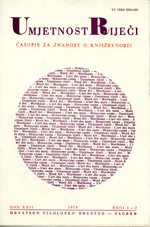Model Goldsmithova romana u genezi jugoslovenske proze
The Model of Goldsmith's Novel in the Genesis of Yugoslav Prose
Author(s): Jože PogačnikSubject(s): Literary Texts
Published by: Hrvatsko filološko društvo
Summary/Abstract: The reception of Oliver Goldsmith within the development of Yugoslav fiction was marked by Goethe's interpretation of The Vicar of Wakefield. The relevance of that interpretation was generally accepted, although its content was rather vague. The vagueness made it possible for the same propositions to serve as a basis for fundamentally different types of reception from the literary and aesthetic point of view. In Sel'bian literature, Goldsmith represented »Enlightenment« (D. Obradović, V. S. Karadžić), whereas in Croatian literature he was viewed in a »Romantic« light (S. Vraz). Goldsmith was intl'oduced rather late to Slovenian culture, but his influence was a more lasting one; it was mainly used for the consolidation of protorealistic elements (F. Levstik, J. Stritar). Goldsmith's effect on Serbian and Croatian literature appear more natuml in terms of literary developments; in Slovenia, it only becomes intelligible if we realize that the aesthetic assumptions of rationalism and realism were closely interrelated in literature. Goldsmith's novel became a model in Yugoslav fiction, as it permiitted two ideological and aesthetic identifications. The former wars made in the field of characterology, the latter in the field of sociology. The aspect of characterology was supported by the thesis on literature as a force of national integration (resulting in the Enlightenment and the realistic type of reception), while the sociological approach emphasized the »middle« social stratum, mainly the independent peasantry. This »middle« stratum corresponds precisely to Goldsmith's notion of the "middle order of mankind", with the same sociological significanee as in the identification of the peasantry as the people, as found in J. Kopitar, V. S. Karadžić, or F. Levstik.
Journal: Umjetnost riječi
- Issue Year: 1978
- Issue No: 1-2
- Page Range: 45-57
- Page Count: 13
- Language: Croatian
- Content File-PDF

